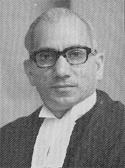Raghunandan Swarup Pathak
This article includes a list of general references, but it remains largely unverified because it lacks sufficient corresponding inline citations. (February 2014) |
Raghunandan Swarup Pathak (25 November 1924 – 17 November 2007) was the 18th Chief Justice of India. He was the son of Gopal Swarup Pathak, a former Vice President of India.[1]
Raghunandan Pathak | |
|---|---|
 | |
| 18th Chief Justice of India | |
| In office 21 December 1986 – 18 June 1989 | |
| Nominated by | CJI Y V Chandrachud |
| Appointed by | President Giani Zail Singh |
| Preceded by | P. N. Bhagwati |
| Succeeded by | E.S. Venkataramiah |
| Chief Justice of Bombay High Court | |
| Preceded by | Prakash Chandra Tatia D. N. Patel (acting) |
| Personal details | |
| Born | 25 November 1924 |
| Died | 17 November 2007 (aged 82) New Delhi, India |
He was one of the four judges from India to have been on the International Court of Justice in The Hague (the others being Benegal Narsing Rau who served at ICJ during 1952 to 1953 Nagendra Singh who served as its President from 1985 to 1988 and former Supreme Court justice Dalveer Bhandari, who currently sits upon the World Court).[2] He did his schooling from St. Joseph's College, Allahabad and had studied law at Allahabad University. After practising law at Allahabad, he became Judge at Allahabad High Court in 1962 and later Chief Justice of Himachal Pradesh High Court in 1972.[3]
At the Supreme Court of IndiaEdit
Pathak was made a judge at Supreme Court of India in 1978 and became its 18th Chief Justice on 21 December 1986. He is remembered as a judge who was a man of the middle and was able to bring relative peace to the Court. He served as Chief justice for two and a half years during which time a dozen judges were appointed to the Court. Five of them — Madhukar Hiralal Kania, Lalit Mohan Sharma, Manepalle Narayana Rao Venkatachaliah, Aziz Mushabber Ahmadi, and Jagdish Sharan Verma— went on to serve as Chief Justices between 1991 and 1998.[4]
Bhopal gas disasterEdit
Pathak facilitated an out of court settlement[5] between Union Carbide Corporation and the Government of India in 1989 regarding the compensation to be paid for the Bhopal gas tragedy. The government had sought $3.3 billion but received only $470 million and the settlement resulted in the dropping of criminal liability charges against Union Carbide in the case. Within three months of his retirement Pathak became a member of the International Court of Justice at The Hague.[6][7] The Supreme Court in 1991 upheld the settlement in 1991 thus ending Union Carbide's liability in the case.[8]
Judge of the International Court of JusticeEdit
Pathak was elected a judge of the International Court of Justice and served in that position from 1989 to 1991. He was elected in "casual election" that was held following the death of M. Nagendra Singh, an Indian judge who was then serving his second term at the International Court. In 1991 India decided not to renominate Pathak, who however entered the fray with the backing of Ireland. After the Irish government came under attack in the Dáil from MPs who blamed Pathak for approving, as Chief Justice of India, the $470-million Bhopal gas disaster settlement with Union Carbide, Pathak withdrew from the race.[9]
Oil-for-Food Programme inquiryEdit
In November 2005, Justice Pathak was appointed to inquire into alleged Indian links in the Oil-for-Food Programme. On 3 August 2006, he submitted his 90-page report which indicted suspended Congress leader and former External Affairs Minister K. Natwar Singh.[10]
DeathEdit
Pathak died on 17 November 2007, at the age of 82 following a heart attack in New Delhi.[11]
ReferencesEdit
- ↑ "Former CJI Pathak dead". The Indian Express. 19 November 2007. Retrieved 3 March 2013.
- ↑ Nagendra Singh, Judge At the World Court, 74 New York Times, 13 December 1988.
- ↑ "Former Hon'ble Chief Justices' of India". Retrieved 21 February 2012.
- ↑ "Judges of the Supreme Court of India: 1950 - 1989 - The Pathak Court (1986–9)". Oxford university Press. Retrieved 3 March 2013.
- ↑ "For A Few Pieces Of Silver". Tehelka. 26 June 2010. Retrieved 3 March 2013.
- ↑ "Spotlight on judges who ruled in favour of Union Carbide". DNA. 10 June 2010. Retrieved 3 March 2013.
- ↑ Keswani, Raajkumar (9 June 2010). "Bhopal verdict: Worst legal disaster of recent history". The Tribune. Retrieved 3 March 2013.
- ↑ "Centre to press for Dow picking up clean-up tab". The Times of India. 20 June 2010. Archived from the original on 11 April 2013. Retrieved 3 March 2013.
- ↑ "After two decades wait, India looking to get slot in ICJ". The Hindu. 19 June 2011. Retrieved 3 March 2013.
- ↑ "Oil-for-food: Pathak committee indicts Natwar". The Times of India. 3 August 2006. Archived from the original on 3 January 2013. Retrieved 24 September 2012.
- ↑ Former CJI R S Pathak passes away
External linksEdit
| Legal offices | ||
|---|---|---|
| Preceded by Prafullachandra Natwarlal Bhagwati |
Chief Justice of India 21 December 1986– 6 June 1989 |
Succeeded by Engalaguppe Seetharamiah Venkataramiah |